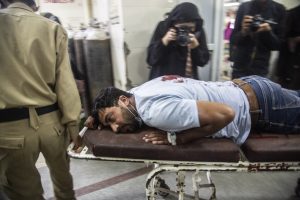On June 24, Prime Minister Narendra Modi met in New Delhi with 14 mainstream political leaders from Jammu and Kashmir (J&K) including four former chief ministers of the erstwhile state.
His outreach to the J&K leaders came almost two years after his Bharatiya Janata Party (BJP) government revoked Article 370 of the Constitution, in effect stripping the state of its autonomy. The BJP government also split J&K into two union territories: Ladakh, and Jammu and Kashmir.
After the abrogation of Article 370, Jammu and Kashmir faced a communication blackout for over 200 days. The torchbearers of democracy in the valley, its mainstream political leaders, were detained. Several religious leaders were arrested and kept in various prisons in and outside the Kashmir valley.
The BJP government tried its level best to extinguish any manifestation of dissent in Kashmir. More soldiers were brought in to patrol the streets and confine locals to their homes. Gatherings of over three people were banned. Those who came out on the streets to voice their feelings of betrayal by the Indian government were met with pellet guns. Far from integrating Kashmiris into India, as Home Minister Amit Shah promised, the silencing of Kashmiris alienated them from New Delhi.
When Prime Minister Modi invited J&K’s political leaders to talks it marked a seeming shift in New Delhi’s Kashmir policy. For one thing, the leaders he invited fro talks were the very politicians his government had jailed before and following the August 5, 2019 revocation of J&K’s autonomy.
Understandably, the invitation to the Kashmiri politicians was met with much skepticism among the J&K leaders, since the government had not announced an agenda.
Still, they participated.
They felt the outreach was “a confidence-building measure” aimed at showing the Kashmiri people that “the Modi government wanted to hear their demands,” Ghulam Nabi Lone Hanjura, general secretary of the People’s Democratic Party told The Diplomat.
It was apparent even during the meeting that not much would come of it. Apparently, all that the J&K politicians did at the meeting was to reiterate their demands, including the restoration of Article 370, J&K’s statehood, and constitutional guarantees.
Otherwise the politicians returned to the valley empty-handed.
Mohammed Yousuf Tarigami, a Central Committee member of the Communist Party of India (Marxist) and spokesperson for the People’s Alliance for Gupkar Declaration, recalls that he viewed the meeting as an opportunity to voice concerns relating to the situation in the valley.
“We had expectations of a follow-up on our demands for restoration of statehood and the release of prisoners,” Tarigami said. “Unfortunately there has been no follow-up. The government has not responded to our demands.”
Pointing out that “almost two months have passed since the meeting,” Hanjura said that “a process to bridge the distance between Delhi and Jammu and Kashmir is yet to be initiated.” He now feels that the June meeting “was only a stunt for public consumption.”
Seven weeks after that meeting, New Delhi has done little by way of follow up.
While Kashmiri leaders have been persistent in their demands regarding restoration of J&K’s autonomy, the freeing of political prisoners, and fresh elections, the Indian government has been working on the redrawing of electoral constituencies in J&K with the help of a delimitation commission.
On July 6, the government sent the delimitation commission headed by former Supreme Court judge Ranjana Prakash Desai to carve out constituencies in J&K. This commission held meetings with political parties, district election officers and other stakeholders. The People’s Democratic Party boycotted the process.
It is said that seven more constituencies will be added to J&K’s 83-member Assembly ahead of the elections, according to the J&K Reorganisation Act.
The priority accorded to delimitation of constituencies over the people’s grievances indicates that Modi’s meeting was aimed at promoting the BJP’s electoral interests and helping it install a Hindu chief minister in the Muslim majority region.
“In his August 15 (India’s Independence Day) speech, Modi mentioned J&K. But not a word was uttered on the restoration of statehood or constitutional safeguards,” Tarigami, who attended the meeting in New Delhi lamented.
“We neither asked for the sky nor did we expect anything big,” he said. “But there was an element of hope that there would be some follow-up” by the Modi government.
That, unfortunately, has not happened.
Modi’s talks initiative seems to have run aground even before it got started.

































